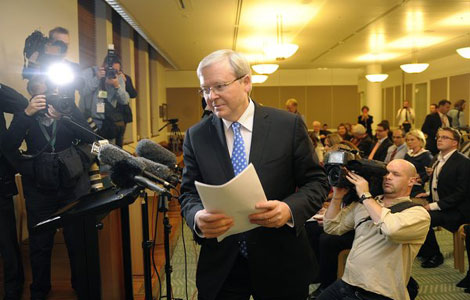Tougher punishments for polluters proposed
Updated: 2013-06-27 02:11
By ZHAO YINAN (China Daily)
|
||||||||
Draft may be better deterrent, but environmental NGOs unhappy
The draft amendment to the Environmental Protection Law has proposed the strictest-ever punishment for polluting companies in China.
Companies that illegally dump sewage and fail to modify their discharge and emission systems to meet the required standard are subject to fines based on a consecutive daily rate, according to the draft amendment to the Environmental Protection Law.
The draft was proposed for a second reading on Wednesday.
If passed, it would introduce the toughest penalties ever imposed on polluting companies. Current regulations on illegal dumping and emissions generally have a ceiling on penalties. For instance, the country's Law on Prevention and Control of Air Pollution stipulates that polluters are subject to a one-time penalty of up to 200,000 yuan ($32,540).
Environmental protection law requires companies to discharge sewage according to an amount approved by the government, but the financial penalties against those that fail to meet the standard have long been criticized because they don't deter businesses from polluting.
Cao Mingde, an environmental law professor at China University of Political Science and Law, said the draft, which allows the financial penalty to accumulate at a daily rate, will motivate polluters to improve their discharge and purification systems in a timely manner.
According to the draft, companies and other organizations that intentionally escape supervision and discharge excessive pollutants may be prosecuted. Those whose activities are not serious enough for criminal prosecution will be punished according to the law on penalties for administration of public security, for instance being put under administrative detention.
Besides harsher punishment, the draft introduces measures to encourage law-abiding and environmentally friendly enterprises. The government is urged to offer preferential policies in tax and loans to enterprises that have a good record in reducing pollution and protecting the environment.
The proposed regulation on tax and loans is accompanied by a government policy that the State Council issued earlier this month, which says that loans should not be made to projects that haven't passed the environmental assessment, and no electricity or water should be offered to such projects.

 Visit aids 'trust-building process'
Visit aids 'trust-building process'
 King of Pop returns
King of Pop returns
 Crowds cheer Court decision on gay marriage
Crowds cheer Court decision on gay marriage
 Hiring index signals further job weakness
Hiring index signals further job weakness
 Dance becomes popular stress relief
Dance becomes popular stress relief
 Philippine, US start Naval exercise in S China Sea
Philippine, US start Naval exercise in S China Sea
 Supreme Court gay rights ruling celebrated across US
Supreme Court gay rights ruling celebrated across US
 Rudd returns as Australian PM after Gillard
Rudd returns as Australian PM after Gillard
Most Viewed
Editor's Picks

|

|

|

|

|

|
Today's Top News
US Senate approves landmark immigration bill
US collects Internet data on citizens
More Americans see Snowden as patriot: Poll
Visit aids 'trust-building process'
Crowds cheer gay marriage decision
Industry enjoys profitable month
China's civil servants top 7 million
King of Pop returns
US Weekly

|

|








